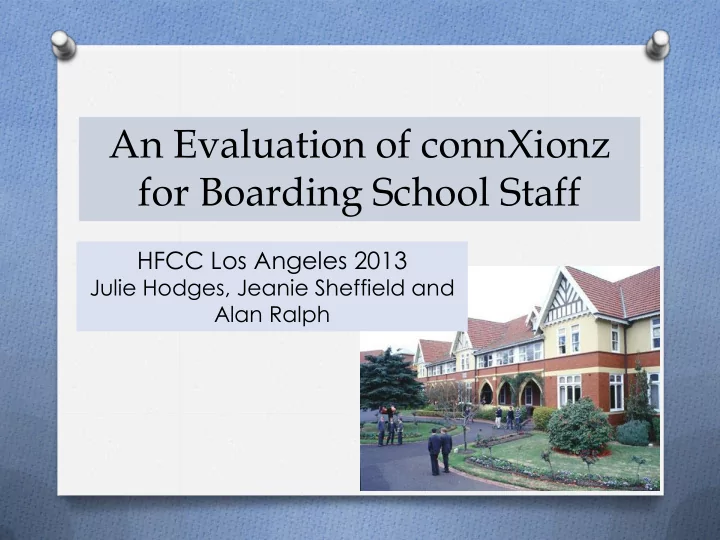

An Evaluation of connXionz for Boarding School Staff HFCC Los Angeles 2013 Julie Hodges, Jeanie Sheffield and Alan Ralph
Overview O Rationale for the research O Comparison between staff and boarders’ perceptions of the boarding environment O Evaluation of the staff training program connXionz for Boarding School Staff O Challenges O Future directions O Questions
The boarding environment and the role of boarding staff
In loco parentis role of boarding staff O ‘in place of a parent’ O ‘having or taking on the responsibilities of a parent when dealing with somebody else's child’
How many boarders? Currently around 20,000 young Australians aged 12-17 years live in the in loco parentis care of boarding school staff for 38 weeks each year.
Is the boarding environment influential in boarders development?
Home away from home? Study 1 Comparison between staff and boarders’ perceptions of the boarding environment o conflict o social support o boarding school climate o 2 open-ended questions - enjoy? - difficult or don’t enjoy?
Who participated? 121 staff and 415 boarders from nine boarding schools across South East Queensland, Australia
Demographics – Study 1 Staff O 20 – 60 years O 57% parents O <1 -15 years in boarding Boarders O 13-17 years O <1 – 5 years boarding
Measures Measure Staff internal Boarder consistency internal (Scales scored 1-10) consistency Conflict – CBQ -10 .87 .90 Climate - Life in Your Boarding School - 10 .87 .84 Social Support – Board4S .95 .94
Home away from home? Empirical support
Conflict (low scores = less conflict) 6 5 4 3 2 1 0 Boarders Staff
Boarding School Climate (high scores = more positive climate) 9 8 7 6 5 4 3 2 1 0 Boarders Staff
Social Support (high scores = more support) 10 8 6 4 2 0 Boarders Staff
Qualitative accounts The literature presents polarised perspectives on boarder outcomes. ‘independence’ Vs ‘emotional deprivation’
“Boarding makes you more independent and free thinking” “it teaches me to respect others and listen to their opinions” (White, 2004)
Boarding is equivalent to socially condoned child abuse (Duffell, 2005; Schaverien, 2011)
Randomised Conrolled Trial of connXionz for Boarding School Staff
So.......what does a parenting program have to offer boarding staff acting in loco parentis ?
connXionz and Triple P Tailoring the Program O The importance of the in loco parentis role O Complex boundaries between staff and boarders O Consistent application of strategies
connXionz and Triple P CONNXIONZ DESCRIPTION APPLICATION TO STRATEGY THE BOARDING CONTEXT Spending time Spending frequent, brief Opportunities for with boarders amounts of time when no boarders to enjoy pressure to get other adult contact; to things done demonstrate an interest in boarders Talking to Having brief Promoting opportunity boarders conversations about to voice opinions and topics that are of interest to discuss issues and to them interests important to them Showing Adult-to-teenager Demonstrate appropriate displays of affection that appropriate ways of affection don’t cause showing affection embarrassment
Staff Training O Duty of Care – A Certificate Course in Residential Care (Hawkes, 2001, 2010) O Currently 382 boarding staff of an estimated 1500 have been accredited in this training course (ABSA. 2013)
RCT of c onnXionz for Boarding School Staff O 9 boarding schools in South East Queensland O Schools matched on population and sex of boarders then randomly allocated to condition O N = 58 staff members participated in connXionz training course
RCT of connXionz for Boarding School Staff Variable Intervention Wait-list (N=32) (N-26) Female 14 Female 18 Sex* Male 18 Male 8 Age* 45.66 (12.34) 30.38 (10.05) Parent* 75% 35% Years in boarding* 7.55 (7.23) 4.35 (4.28) University Education* 45.7% 53.8%
RCT- Measures Variable Pre-intervention Post-intervention Difference score I WL I WL I WL Competence 78.69 80.96 88.83 86.04 10.13* 5.08* Self-efficacy and role 34.96 40.59 36.47 38.42 2.65* -1.58 satisfaction Adjustment 7.76 3.07 5.67 3.56 -2.09 -.41 Stress 9.01 4.85 6.23 4.53 -2.78* -.32 Anxiety 4.07 2.41 3.04 1.72 -1.01 -.69 Depression 2.44 .67 2.06 .95 -.57 .18
Competence – Intervention, Control
Competence – further analyses O Intervention group reported significantly greater increase in 13 of 15 competencies measured O Greatest improvements in: - Establishing positive relationships - Promoting boarders’ development - Negotiating behaviour contracts to promote self-control
Satisfaction ratings 6.5 6.45 6.45 6.4 6.35 6.32 6.3 6.25 6.2 6.2 6.15 6.1 6.05 Active participation Overall rating Corse Content
Challenges O Recruitment O School terms O Time constraints O Staff commitment (voluntary/conscripted) O Data collection & follow-up
Future Directions O Which model? O Accreditation O Supervision and support
Questions?
Recommend
More recommend